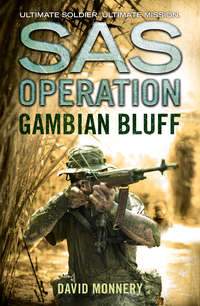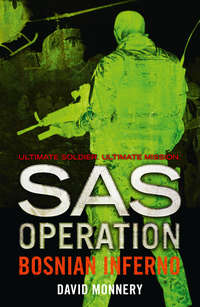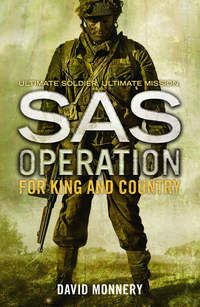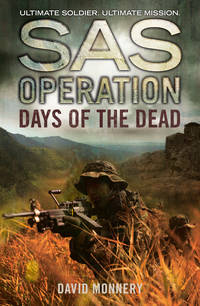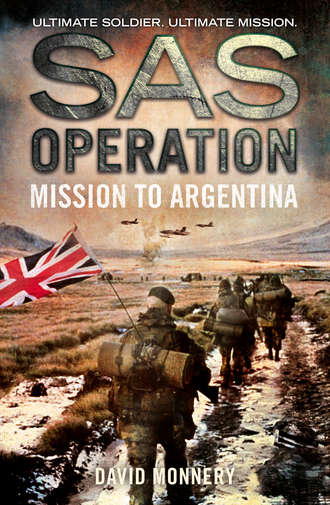
Полная версия
Mission to Argentina
‘I’m sorry,’ he said, ‘my name is Baldwin, Phillip Baldwin.’
‘And you work for?’
‘Oh, the Foreign Office, of course.’
‘And what is this all about? Is the Foreign Office worried that the exile community is going to undertake a campaign of sabotage against the war effort?’
This time he did not smile. ‘How do you view your government’s invasion of the Falkland Islands, Ms Fuentes?’
‘As just one more attempt to divert the attention of my country’s people from their rulers’ cruelty and incompetence.’
‘Ah,’ he said, twiddling his pen and looking out of the window. ‘In that case, would you consider returning to your country to work for us?’
She was momentarily stunned. ‘You mean as a…as a spy?’
‘Yes, I suppose you could call it that.’
She half-laughed: the idea seemed so ludicrous.
Balwin seemed to take slight offence. ‘Is it such a surprising request? You opposed that government once by force of arms. And it must have crossed your mind that defeat in this matter would probably finish the military as a political force for years.’
That at least was probably true. As was the reverse: victory would keep the beasts in power for the rest of the century. She looked across the desk at the Englishman, still idly twirling his pen. He was just going through the motions, she realized. He did not expect any Argentinian exile to agree to such a proposal, but someone somewhere in the bureaucratic labyrinth had decreed that they all had to be asked. As far as he was concerned, she would soon be walking away across the yard and another of her compatriots would be sitting in the chair answering the same questions.
‘To spy on what?’ she asked.
‘That would depend,’ Baldwin said slowly, stirring slightly in his chair. ‘For the moment we are more interested in establishing a willingness in principle.’
‘Are you offering anything in return for my services?’ she asked.
His eyes narrowed. ‘I think it would be hard to establish a real basis of mutual trust if remuneration was involved,’ he said piously.
‘Success would be its own reward,’ she suggested sweetly.
‘Something like that,’ he agreed, with the faintest of grins.
‘And if I wanted something other than money, like, for example, permanent residency visas for several friends?’
‘That could probably be arranged.’
‘I will consider it,’ she said. The idea still seemed ludicrous, but…
Looking pleasantly surprised, Baldwin wrote down a number on his notepad, tore the sheet off and handed it to her. ‘You can reach me on this number,’ he said. ‘Day or night.’
Isabel walked back to Piccadilly, phoned the travel agency with the news that she would not be back that day, and took a 19 bus to Highbury Corner. It was almost five o’clock. Her flatmate would probably not yet be home, but Isabel felt reluctant to risk having her thoughts interrupted by more instalments of the endless romantic soap opera which Rowan passed off as a life. She bought a cup of tea at the outdoor café in Highbury Fields and carried it across to one of the seats in the area barred to dogs.
For a while she just sat there and watched the world go by. Or rather, watched England go by. Since the meeting in Baldwin’s office she had felt like she was living in an alien country. Which, of course, she was. It was just that most of the time the feeling was buried somewhere at the back of her mind.
‘You must miss the heat,’ people used to say to her when she first arrived. She had tried to explain that her birthplace in the far south of Argentina was just as cold and a lot windier than most of Scotland, let alone England, but nobody really listened. South America was jungle and gauchos and Pele and the carnival in Rio. It had to be hot.
She conjured up a picture of ice floes in the Beagle Channel, the wind like a knife, a beach full of penguins, the aurora australis shimmering in the southern sky. That was her home.
It was the one line, she realized, which had got to her. ‘Would you consider returning to your country?’ That simple question had somehow brought it all back. She had not been really unhappy in the prison of exile, not since the year or more of grieving for Francisco and of learning to live with what they had done to her. But she had not really been happy either, just endlessly marking time. The line from that Bob Dylan album of Michael’s said it better than she ever could: ‘And I’ve never gotten used to it, I’ve just learned to turn it off.’
That was her life – turned off. Friends, a lover, but no real comradeship, no real love. No purpose.
But could she really work for the English?
‘My enemy’s enemy is my friend,’ she said softly to herself. ‘Sometimes,’ she added. Surely the Junta would lose this war anyway, without her putting her own life at risk?
‘If no one else will fight, then all the more reason for us to.’ She could hear Francisco saying it, in the candlelit lodgings in Córdoba. They had just made love, and as usual he had been lying on his back, blowing smoke rings at the ceiling, surveying the world situation.
They had tortured and killed him, and maybe this was fate’s way of giving her the chance to even the score. Maybe the wretched Malvinas had finally found a use for themselves, as a grave for the military’s prestige. Defeat would bring a new government in Buenos Aires, one with untainted hands, one that could admit to what had been done to all those tens of thousands. Such honesty might bring the hope of redemption for her country. And for her.
‘Don’t cry for me, Argentina,’ she muttered ironically.
She got up and walked slowly across the park to the flat she shared. Rowan was not home yet, and for once Isabel felt the need of some alcohol. An opened bottle of burgundy supplied the necessary, and she sat nursing a glass in front of the six o’clock news. The fleet was sailing out of Portsmouth harbour, flags flying, men saluting, loved ones waving. She remembered what Michael had said the previous evening, that no matter how much he despised the patriotism and the flag-waving, no matter how clearly he could see through all the sanctimonious crap, he had been appalled to discover that there was still a small part of him that felt somehow connected, even proud, of all this.
She had understood exactly what he meant, because she knew that a small part of her wanted the English to fail in this war, wanted the beasts of the Junta to triumph in Argentina’s name. And more than anything else, or so she later came to believe, it was the need to silence that small voice which led her to call Baldwin the next morning.
The next few days seemed more than a little unreal. She called in sick to her two jobs, perhaps not really believing that her new career as a Mata Hari would amount to anything. The Englishmen who were supposedly preparing her for her new career certainly did not inspire much confidence.
For one thing, it rapidly became clear to Isabel that they knew next to nothing about her country, either in the general sense or in terms of the current situation. What information they did have seemed to come from either the Argentinian press or American signals intelligence. The latter source offered great wads of information, almost all of which was rendered useless by the lack of any accompanying indication of the enemy’s intentions. The newspapers, needless to say, offered only lies and conceits. It was obvious that British Intelligence had no one on the ground in Argentina.
Now, faced with the prospect of having someone, the Intelligence people seemed initially incapable of deciding what to do with her. Isabel could imagine them discussing the possibility of her seducing General Galtieri and learning all the Junta’s secrets. Still, she did not fool herself into believing that they thought any more highly of her than she did of them. She was, after all, an Argie, a woman and a communist – which had to be three strikes and out as far as the Foreign Office was concerned. If it was not for the fact that she was the intelligence services’ only proof that they were doing anything at all that was useful, she would probably have just been sent home in a taxi.
It was on Friday 9 April, the day the other Western European countries swung into line behind Britain’s call for sanctions, that some semblance of a coherent mission was offered to her. Baldwin escorted her through a maze of Whitehall corridors and courtyards to a spacious top-floor office overlooking St James’s Park, and into the presence of a cadaverous-looking Englishman with slicked-back black hair and a worried expression. His name was Colonel William Bartley, but he wore no uniform, unless the City gent’s pinstripe suit counted as one.
‘We have thought long and hard about where and how you could be most usefully deployed,’ he said, after the exchange of introductions and Baldwin’s departure. ‘And…’ He stopped suddenly, sighed, and leaned back in his chair. ‘I’ve read your file, of course,’ he continued, ‘and you wouldn’t expect me to sympathize with your politics…’
‘No,’ she said.
‘But of course, if these weren’t your politics then you would not be willing to betray your own country on our behalf, so I can hardly complain.’ Bartley grunted, probably in appreciation of his own logic. ‘But you’re obviously intelligent, and you can doubtless see our problem.’
She could. ‘You don’t want to tell me anything which I might turn over to my beloved government. Well, what could I say to convince you?’
‘Nothing. In any case we are not merely concerned at the possibility that you will pass on information willing. There is always the chance you will be captured. And of course…’ Bartley left the unspoken ‘tortured’ hanging in the air.
‘I understand. And you are right – there’s no way I would endure torture to save your secrets.’ As I once did for a lover, she thought. ‘So,’ she said, ‘it’s simply a matter of calculating risks, is it not? The risk of my being a double agent, or of getting caught, against the risk of not telling me enough to make using me worthwhile.’
‘Exactly,’ Bartley agreed.
She stared at him in silence.
‘You are from the south,’ he said, ‘which is useful from our point of view. How difficult would it be for you to set up shop, so to speak, somewhere like Rio Gallegos? Are there people who would recognize you? What sort of cover story could you come up with?’
‘I come from Ushuaia, which is a long way from Rio Gallegos. I might be recognized by someone – who knows? – but not by anyone who would question my presence in the area. I could say I was looking up an old college friend…’
‘Who is not there?’
‘I did not know she had moved, perhaps?’
‘Perhaps. Since you know the country and the people I will leave it to you, but I will give you one other suggestion: you are researching a travel book, perhaps in association with an American equivalent of that agency you work for, checking out hotels, local transport, things to see. It’s a good excuse for moving around.’
‘Perhaps.’ She admitted to herself that it sounded a good idea. ‘And what is my real motive for being there? The airbase, I suppose. You want to know which planes, what armaments, the pilots’ morale.’ She paused. ‘And you’d probably like to know each time they take off. Am I going to have to carry a radio set into Argentina?’
‘I doubt it,’ Bartley said, obviously taken by surprise. ‘How did you work all that out?’ he asked.
‘By reading the Observer. The British fleet was created to operate in the eastern Atlantic, within the defensive cover provided by shore-based aircraft, and the one thing that scares the Admirals is their vulnerability to air attack without such cover.’ She looked at him. ‘Is this the secret you were afraid I’d tell the Junta?’
Bartley at least had the good grace to blush. ‘We think the Super Etendards may be based at Rio Gallegos,’ he added, ‘and doubtless the Observer pointed out how concerned we are about the Exocets they carry.’
‘It did. But if advance warning is what you need, surely it has to be by radio?’
‘Perhaps. We have several weeks to worry about that, and if it becomes absolutely necessary then one can be brought across the border from Chile when the time comes. First, we need to get you bedded in.’
For the next few days she was given an in-depth briefing on military matters, at the end of which she could not only recognize a Super Etendard by its silhouette but also identify a wide range of military equipment which might conceivably be en route to the Malvinas from the Rio Gallegos airbase.
In the meantime her journey to Santiago – via New York and Los Angeles on three separate airlines – had been booked, her share of the rent on her flat paid six months in advance, and four fellow exiles had been given reason to wonder at the sudden beneficence of the Home Office in allowing them permanent residence status. Rowan and her other friends had been told that she had been given a three-month commission to update tourist information in Peru and Bolivia. They were all suitably jealous.
Michael was also angry. Why had she not consulted him? Did she think she could behave in a relationship as if she was a single person? Did she care about him at all?
The answer to the last was: not enough. She liked him, enjoyed talking with him, found sex with him occasionally pleasurable but mostly just harmless fun. It was not his fault, and she would have felt sorrier for him if she believed he really loved her, but as it was…The last night before her departure, as she watched her nipple harden in response to his brushing finger and kiss, the bizarre thought struck her that she was like a ship which had been struck below the waterline, and that her captain had ordered the sealing of all the internal bulkheads, the total compartmentalization of the vessel. The rooms were all still there but she could no longer move from one to another. There were no connections. In the torture chambers of the Naval Mechanical School she had lost the pattern of her being, which was probably just a fancy description of the soul.
Her plane landed in Santiago de Chile at five in the morning on 19 April. According to the newspapers, the Junta’s response to US Secretary of State Haig’s peace plan was being conveyed to London, but no one seemed too sanguine about the prospects. According to her own calculations, the British Task Force would be just over halfway to the Malvinas by this time. There was still between ten days and a fortnight before it came within range of the Argentinian Air Force.
The men in London had given her a new identity, albeit one very close to her own. She was now Isabel Rodriguez, a thirty-one-year-old Argentinian who had lived for several years in the United States, and who had never involved herself in the politics of her homeland. Later that evening, in her room at the Hotel San Miguel, she received the expected visitor from the British Embassy, a sallow, dark-haired man with wire-rimmed spectacles who looked distinctly un-English.
He introduced himself as Andrew Lawson. ‘I am British,’ he said apologetically, as if in the past doubts had been raised. ‘I just look like a South American. Probably because my mother was Spanish. I have brought you the money’ – he laid two piles of notes, one smaller Chilean, one larger Argentinian, on the bed – ‘and the car is in the underground car park. A black Renault 5, AY1253S, in space B14. Have you got that?’
She nodded.
‘I shall also be your contact in the south,’ Lawson went on, taking a map from his pocket and unfolding it on the bed. ‘See, this is Argentina…’
‘I know. I was born there,’ she said acidly. Maybe the Junta would win the war, after all.
‘Ah, I’m sorry, of course. You know the south well?’
‘I grew up in Ushuaia.’
‘Ah, right. Do you know this road here, between Rio Gallegos and Punta Arenas?’
‘I have travelled it many times, by car, by bus.’
‘Good. What we need is a dead-letter drop – you understand? Somewhere where we can leave each other messages for collection. It should be on the Argentinian side, because the fewer times you have to cross the border the better. A stretch of empty road, a bridge over a stream, something like that.’
‘It would be harder to find a stretch of road that isn’t empty,’ she said drily. ‘Why must I cross the border at all?’
‘A good question. And the simple answer is, I can’t think of a safer way for you to let me know the location you’ve chosen. If you can…’
She thought about it. ‘You can’t come to me?’
‘I could risk it, but let’s face it, I’d have trouble passing as a local at the border. I may look like a Latin American, but my Spanish isn’t good enough…’ He shrugged.
‘A go-between,’ she suggested.
‘The fewer people know who you are the better.’
That made sense. ‘OK, so I come into Chile…’
‘To Punta Arenas. Your cover is a tourist guide, right? So you have to check out the local museums. There are three in Punta Arenas: the Regional Magellanes, the Patagonian Institute and the Salesian College. I’ll be at the Salesian each Thursday morning from the 29th on.’
She looked at him. The whole business suddenly seemed completely insane. ‘Right,’ she said.
The road across the Andes was full of wonder and memories. Isabel had last driven it with Francisco in the early spring of 1973, when they had visited Chilean friends in Santiago, both of whom had perished a month or so later in the military coup. Then as now the towering peak of Aconcagua had shone like a beacon, sunlit snow against a clear blue sky, but then the love of her life had been with her, and the darkest of futures still bore a gleam of hope.
This time too she stopped at the huge Christ of the Andes, bought a steaming cup of coffee from the restaurant and walked up past the statue and its admiring tourists to where she could see, far down the valley, the distant green fields of her native country.
She had over 1000 miles to drive, and she planned to take at least three days, acclimatizing herself to the country as she travelled. That evening she stayed in Mendoza and, after eating in a half-empty restaurant, sat in the city’s main square and listened to the conversations going on around her. Most of them seemed to be about the Malvinas dispute, and she found the level of optimism being expressed hard to credit.
The purchase of a newspaper helped to explain the high spirits. According to the Government, the British were bluffing – there would be no war between the two countries. Britain would huff and puff, but eventually it would come to its senses. After all, what nation would really send a huge fleet 10,000 miles for the sake of 1800 people? Though, of course, the editorial was swift to mention that, if by some mischance it really did come to a fight, then the armed forces of the nation were more than ready to do what was necessary for the glory of, etc, etc.
‘Wrong,’ Isabel muttered to herself, staring across the square at the vast wall of the silhouetted mountains to the west. There was no hope of the British coming to their senses, and consequently no chance that they were bluffing.
Isabel’s sense of a nation with its head buried deep in the sand did not fade as she travelled south over the next few days. Everywhere she went she heard the same refrain: there would be no war. How could the British fight one so far from home? Why would they do so even if they could? There was no antipathy towards distant England; if anything, the old connection between the two countries seemed almost stronger for their mutual travail. Isabel was half-amazed, half-amused, by how many of her countrymen and women felt vaguely sorry for the British. It was almost pathetic, people told each other, the way the old country clung on to these useless relics of their past imperial splendour.
Her own state of mind seemed to be fluctuating more wildly with each day back in her native country. It all seemed so familiar, and pleasantly so, and it took her a while to realize that what she was reliving was her childhood and youth in the countryside, that memories of the city years with Francisco would need different triggers – the smell of San Telmo streets on a summer evening, book-lined rooms on a college campus, young earnest faces, a gun laid out in pieces on an oilskin cloth.
Each mile to the south took her further from those years, closer to the innocence which they had destroyed. Driving down arrow-straight roads across the vast blue-grey steppes of Patagonia seemed almost like a trip into space, cold and cleansing, more than human.
It was four in the afternoon on Saturday 24 April when Isabel reached the outskirts of Rio Gallegos. The town seemed much changed from when she had last seen it some ten years before. The oil industry had brought prosperity and modernity, along with a refinery which peeked out over the mostly brick-built houses.
The Hotel Covadonga in Avenida Julio Roca seemed to avoid the opposite extremes of ostentation and a clientele composed entirely of sex-starved oil workers. It was also centrally located and spotlessly clean. The manager proudly announced himself as Manuel Menéndez, and was surprised but pleased to learn that she intended to make a lengthy stay. Rio Gallegos was not usually noted for its tourist potential.
After a brief but enjoyable bargaining session over a reduced long-stay rate, Isabel explained about the guide book she was researching, and how the town was ideally located as a centre of operations. But perhaps, she wondered out loud, the trouble with the British over the liberation of the Malvinas had led the military to place temporary restrictions on the ordinary citizen’s freedom to travel?
Not as far as Menéndez knew. There was no longer any civilian traffic from the airbase, and Navy ships were more often seen in the estuary, but nothing much else had changed over the last few weeks. The border with Chile was still open. ‘It is all over, is it not?’ he said. ‘We have the Malvinas back, and I suppose we must thank the Government for that.’
Isabel agreed and went up to her room. After unpacking her meagre travelling wardrobe, she felt tired enough to lie down for a short nap. But her mind was racing too fast for sleep, and she soon decided that she should not waste the last hour of light in her room. Wrapped up in an extra sweater and her Gore-tex windcheater, she strolled purposefully down the Calle Rawson towards the estuary shore. Here she found that a new and pleasant park had been created along the river front. Many families were in evidence, the children already sporting their winter woolly hats. Over by the balustrade a group of young men in Air Force uniforms were enjoying a boisterous conversation.
She walked the length of the park along by the water. Two coalers were anchored in the mile-wide estuary, and beyond them the northern shore offered only a vista of steppe extending into the grey distance. As she turned to retrace her steps a growing roar lifted her eyes to the sky. A Hercules C-130 transport plane was coming in to land at the airport south of the city.
Back at the Covadonga, Isabel lay in the bath, thinking that any delay was likely to weaken her resolve. Wearing the dress she had brought with such an eventuality in mind, she went downstairs to the desk and asked Menéndez’s advice. ‘Where could she have some fun on a Saturday night?’
It turned out there was a big dance that evening at a hall in Calle Pellegrini. After eating a less than exciting dinner at a restaurant off the main square, she made her way across to the hall. At the makeshift bar there were several single women, presumably prostitutes, so Isabel kept her distance and tried to look suitably lost. It was not long before a middle-aged businessman’s wife gave her the chance to tell her story: a single woman in a strange town, wanting some company but…She was soon adopted into their circle, a cross between a guest and a surrogate daughter.
She actually enjoyed the evening, and had almost despaired of it leading anywhere useful, when the party of Air Force pilots arrived. They were given a standing ovation, treated to free drinks and generally feted as the nation’s favourite sons. It did not take Isabel long to pick out her choice: he was tall and dark with a diffident manner and sad brown eyes. He looked as out of place as she felt.


